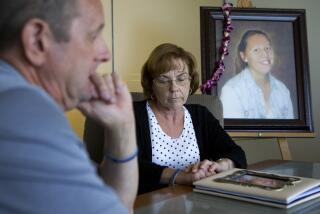Court to Allow Privacy Suit Against TV Show
- Share via
SAN FRANCISCO — The state Supreme Court allowed a privacy suit to proceed Wednesday against a television show that taped and aired a police call to parents about their son’s death.
However, the justices refused to let the case be used as a precedent for other suits.
The suit against the makers of “LAPD: Life on the Beat” is one of a series of recent cases in which private citizens have claimed media intrusions.
Earlier this year, the U.S. Supreme Court allowed suits against police for letting reporters accompany officers into a house, and the state Supreme Court reinstated a suit against a television network that secretly recorded a workplace conversation.
The current case dates from October 1996, when a film crew accompanied police to a Hollywood apartment where Michael Marich, a television actor in his 20s, was found dead, apparently of a drug overdose.
Police called his parents in Houston from the apartment. The officer spoke to the victim’s mother and father but did not address them by name, and their voices were not identifiable. The dead man was not identified on the air, and his face was not shown in the February 1997 program.
The parents’ privacy suit was dismissed by Superior Court Judge
Irving Feffer, who said the tape made the parents’ end of the conversation unintelligible. He awarded the show’s producers, QRZ Media, and the distributors, MGM, more than $30,000 each in legal fees under a law penalizing meritless suits.
But the 2nd District Court of Appeal reinstated the suit in a 2-1 ruling in July.
Even if the parents’ words were inaudible, the tape revealed their private “shock and anguish” to the public, said the opinion by Justice Gary Hastings. He said the parents may have claims for intrusion and eavesdropping on a phone call without consent.
Kelli Sager, a lawyer for QRZ Media, said in Supreme Court papers that no confidential conversation was recorded or disclosed.
More to Read
Sign up for Essential California
The most important California stories and recommendations in your inbox every morning.
You may occasionally receive promotional content from the Los Angeles Times.













